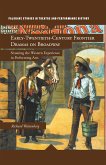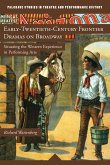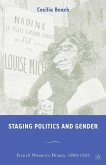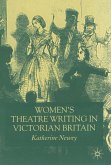In this book, Wendy Arons examines how women writers used theater and performance to investigate the problem of female subjectivity and to intervene in the dominant discourse about ideal femininity. Arons shows how contemporary demands for sincerity and authenticity placed a peculiar burden on women in the public sphere, especially on actresses, who - like professional writers - overstepped the boundaries of what was considered proper behavior for women. Paradoxically, in their representations of ideal women engaged in performance, these writers expose ideal femininity as an impossible act, even as they attempt to perform it in their writing and in their lives.
'This book is a magnificent contribution to the discussion of gender performance back in the day of its literary and dramatic codification in bourgeois modernity. Arons examines the actress playing the antitheatrical, 'natural' woman as a site of female subversion, gender anxiety, and a disconcerting discourse on sincerity. This is a brilliant turn on Lessing's dramatic theory of bourgeois naturalism and Rousseau's model of studied naiveté, Sophie. Arons uses trenchant countermodels an antitheatrical novel heroine playing her role, real-life actresses, women dragged into the public sphere by divorce or scandal, and a comic 'Sophie' satirizing female sincerity and modesty. Arons shows how contentious and unsettled 'natural' femininity was back then, how much strenuous action was necessary to have unstudied charm. This is a must-read for those who think gender performance is only a post-modern concept. Scholars of the novel, dramatic theory, and eighteenth century gender studies will profit from this nuanced study on the drama of performed naIve femininity.' - Jeannine Blackwell, Dean of the Graduate School, University of Kentucky
"An important contribution to our understanding of eighteenth-century culture. Arons derives her critical framework from various discursive traditions and disciplinary areas, combining aspects of each in an original way that allows the reader to examine cultural conventions of women's writing in the eighteenth century-with a focus onGermany but applicable to England or France-from a new perspective. As a result, the conflicting negotiations of upholding gender norms and bourgeois aesthetic demands of 'authentic' representation via writing is revealed. The trope of women writing about the performance of virtue on the contemporary stage or at court provides an ideal vehicle for exploring these issues. This is a truly original book that is a pleasure to read." - Susan A. Cocalis, University of Massachusetts-Amherst
"An important contribution to our understanding of eighteenth-century culture. Arons derives her critical framework from various discursive traditions and disciplinary areas, combining aspects of each in an original way that allows the reader to examine cultural conventions of women's writing in the eighteenth century-with a focus onGermany but applicable to England or France-from a new perspective. As a result, the conflicting negotiations of upholding gender norms and bourgeois aesthetic demands of 'authentic' representation via writing is revealed. The trope of women writing about the performance of virtue on the contemporary stage or at court provides an ideal vehicle for exploring these issues. This is a truly original book that is a pleasure to read." - Susan A. Cocalis, University of Massachusetts-Amherst









